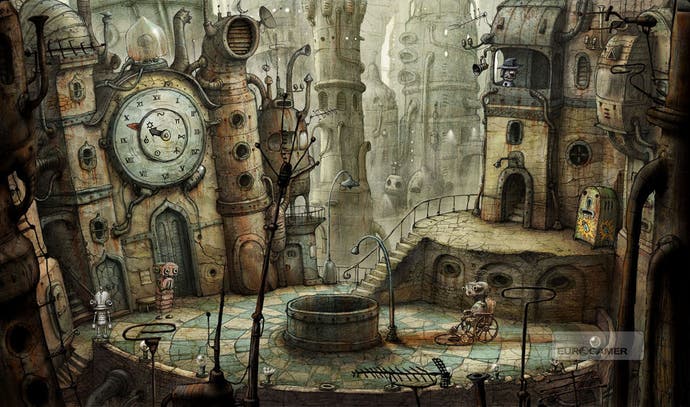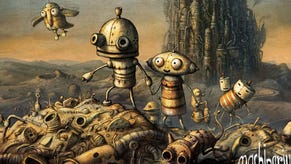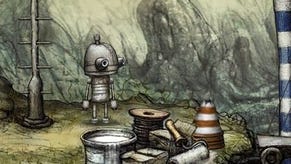Machinarium
Scrapheap challenge.
For those who cry foul at such handholding, the walkthroughs do become a lot less foolproof the further you get into the game. They'll offer broad-stoke solutions but leave plenty of puzzling to fill in the blanks, so it's best not to get too attached to the lifeline they offer. While Machinarium Is happy to nudge you on the right track rather than let you leave in frustration, it also understands that the swell of pride that comes from beating a great adventure puzzle fair and square is one of gaming's most precious rewards, and shrewdly stops you from squandering it through lack of patience.
The game also loves to trip up your progress with more traditional puzzles. Along the way you'll be forced to dust off braincells to move pegs around, rotate coloured dots to fit a pattern and play leapfrog with arrow buttons. There's one of those sliding-block puzzles that you get in Christmas crackers, and even a protracted version of Connect 4 against a robot hustler.
The sheer variety of these puzzles is impressive, but there are times when the game seems a little too much in love with such devices. Unless you're a devoted fan of this sort of puzzle it can get frustrating to be making headway in the effortlessly lovely story, working your way through clever inventory quests, only to be stopped in your tracks and essentially made to solve the equivalent of a Rubik's Cube before you can continue.
At least you'll be treated to some gorgeous visuals while you scratch your head. The lo-fi Samorost vibe is unmistakable, but Machinarium has a much more consistent and tangible sense of place than its whimsically surreal predecessors. This is a world where things may be weird and offbeat (robot jazz, anyone?) but it all makes sense and follows a clear internal logic.
Your robot hero is an instantly likeable little chap, packed with personality despite never saying a word. Background details abound in the scenery, and there are lots of charming interactions that do nothing to further your game, but raise a smile nonetheless. Watching him strain to do a robot poo before sadly shaking his head, for example, or sliding gleefully down a handrail rather than trot down some stairs. Tim Burton's sketches are an obvious touchstone for the visual style, though I couldn't help but see the work of the wonderful Peter Firmin in its warm, hand-made textures.

The game doesn't bother to mask the fact that it's a simple Flash file, and there are clearly benefits to this low-tech approach. It has a tiny system footprint, it boots up almost instantly and you can resume play only a few seconds after double-clicking the desktop icon. There are downsides as well though. Right-clicking only brings up the Flash menu, so inventory manipulation can feel slightly long-winded. Rather than being able to return an item instantly, you need to manually drag it back up to the top menu bar and drop it.
Given that you'll be walking to each area of interest before experimenting with items, it's just enough to make getting stuck feel more frustrating than it needs to be. Navigation also feels a little basic, with no double-click to run somewhere and a tendency to lock your robot into a course that can't be cancelled should you click off-screen by accident. The game's unhurried pace is a pleasure in many ways, but isn't ideal when shuffling between locations searching for the way forwards.
These are far from deal-breaking complaints, although they are enough to keep Machinarium from reaching the top of the score tree where it belongs. Machinarium is a treat for the senses that demands more of your brain, a paradoxically gentle yet punishing riff on a genre that, until now, had been revived but sadly defanged for modern players.






